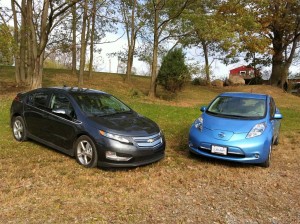Cash-starved California has pulled the plug on a program that provided a significant financial incentive for buyers of approved electric cars, such as the Nissan Leaf.
California was one of more than a dozen states that have enacted some form of cash incentives meant to spur the sale of high-mileage advanced-propulsion vehicles. But the program was limited by the Golden State’s financial problems. Nonetheless, buyers will still get at least one other much sought-after perk: stickers providing access to the HOV, or High Occupancy Vehicle, lanes, which can mean a significantly faster commute for those traveling alone.
The federal government’s $7,500 tax credit for battery car buyers will remain in effect and, in fact, covers a broader range of products, including the Chevrolet Volt. The General Motors plug-in hybrid did not qualify in California because it did not meet the narrow definition of a so-called partial-zero-emission vehicle, or P-ZEV.
Regulators with the California Air Resources Board are looking for some additional funding that would provide $2,500 in cash for motorists who had already purchased a qualifying EV but had not yet been approved for the incentives. CARB also hopes to find enough money for an additional 7,500 buyers.
The news that the rebate has run out comes at a bad time for makers who are just beginning to roll out an array of new battery-electric vehicles, or BEVs, plug-in hybrids and other advanced models, such as the hydrogen-powered F-Cell that Mercedes-Benz is offering in Southern California – one of the few places where motorists can readily find a source of the clean, lightweight gas.
Complicating matters, Nissan just announced that it will increase the base price of its Leaf battery car by 7.4%, or $2,420, to $35,200 with the launch of the 2012 model. Nissan is currently the nation’s leader in battery-car sales, having delivered 4,134 of the BEVs during the first six months of the year. (For more on the 2012 Leaf, Click Here.)
Chevrolet has so far sold just 2,745 of its Volts, though it plans a rapid production ramp-up as it ends the summer break at the Detroit plant building the plug-in. In contrast with Nissan, Chevy plans to lower the price of the Volt in 2012.
Other makers planning to get into the emerging battery-car market include Mitsubishi, which is readying the launch of its little i, along with Ford – which recently introduced the Transit Connect Electric and will launch a battery version of its Focus sedan along with a plug-in microvan called the C-Max Energi.
Virtually every major manufacturer is, in fact, developing some form of battery-based models. Toyota will debut a plug-in version of its Prius next year, following that with a BEV version of the RAV4 crossover. Honda has both a battery car and plug-in coming. Mercedes is even developing a pure battery-powered version of its SLS supercar.
But batteries are expensive and incentives have been critical in helping broaden their appeal, industry officials say, so the loss of the incentive program in California – the largest market for cars in the U.S. and, especially for hybrids and electrics – is a cause for concern.
At least the state will continue offering qualified buyers the coveted HOV access sticker. On the downside, those who previously received such passes for more conventional hybrids lost the car pool access privilege last month.

